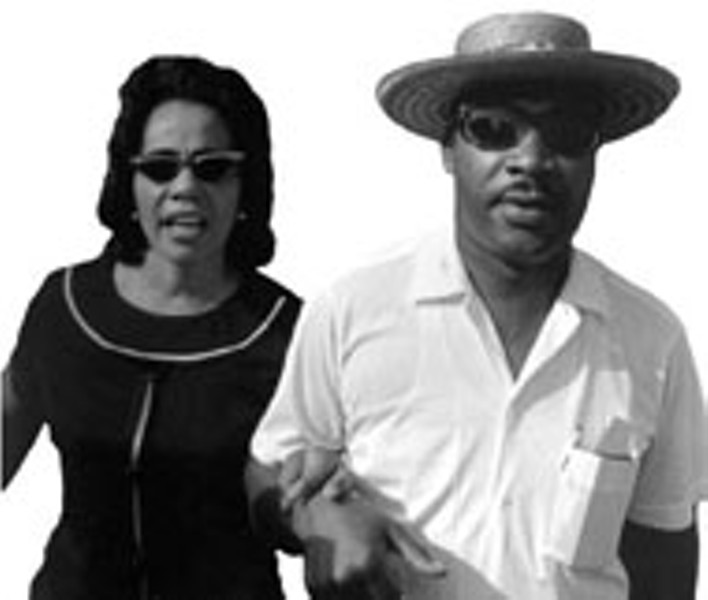"We never talked about assassination," says William Pepper, who worked with King during the last year of his life. Though black activists were being murdered in growing numbers, King's colleagues didn't connect the dots. "We never put together what had happened in Vietnam, Cuba, and the Congo [where CIA-supported assassination plots succeeded, except in Castro's case]. We couldn't apply that to us. It's a lament of mine that we were not more aware."
By 1978, Pepper was in a very different place. He'd become an attorney representing the man convicted of killing King, James Earl Ray. Ray always claimed he'd been framed, and the King family came to believe him. With their approval, Pepper fought for a retrial, but the state of Tennessee successfully blocked the proceeding, and in 1998 Ray died, still protesting his innocence. A year later, Pepper was back in court pursuing the only option left: a civil suit. The jury concurred with his case, and their verdict cited "government agencies" as "parties to this conspiracy." The Justice Department launched an investigation in 2000 but found no basis for the jury's judgment. The official explanation remains what it was at Ray's conviction: that he acted alone.
Now Pepper has written a book about the case that dominated his life for more than 20 years. An Act of State: The Execution of Martin Luther King is being published just in time for the annual testimonials to the fallen leader. This year, the King family will try to break through the ritual by publicizing the book.
The facts, as Pepper presents them, are these. King was the victim of a contract taken out by mobsters already doing business with the government (e.g., laundering money for the CIA). Ray was their patsy, framed by the Memphis police, who also tampered with the crime scene and manipulated evidence. Military units under the auspices of the Special Forces surrounded the motel where King was staying, serving as a backup unit in case the hit man failed. The FBI, which had planted stories deriding King for staying in white hotels, drew him to the black-owned Lorraine, and his secluded room was changed to one with a very visible balcony. Armed black activists who had stationed themselves in a rooming house overlooking the motel were told to leave just before the killing, as were black officers and firefighters.
Though many of these facts are irrefutable (there really was a military unit on the scene, the FBI did plant those derisive stories, King's room was changed, his security detail was dispersed, etc.), they can be interpreted in a less conspiratorial way -- as Gerald Posner does in his book, Killing the Dream, which argues for the official view. There's enough ambiguity in this story to sustain both sides. But of all the assassinations that rocked the 1960s, this one is the least explicable and therefore the most troubling. Revisiting King's murder opens a door to your darkest fears about the government's capacity to act against its own people.
If you were active in the 60s (or plan to be today), it will horrify you to hear Pepper's account of the military's plans for dealing with domestic disturbances: the sharpshooters who traveled through the country with "mug books" of alleged subversives; the maniacal surveillance machine that churned out data on millions of Americans; the links between right-wing racists, J. Edgar Hoover (who was known to be obsessed with King), and top military commanders. Pepper thinks the spark that set all these forces off was King's decision to organize a massive poor people's march on Washington. Like the veterans' army that descended on the capital during the Depression, they would camp there and visit their representatives every day.
Remembering what had happened to those vets -- they were fired on by federal troops -- the government feared that King's march would become a bloodbath.
"The view of official intelligence," Pepper says, was that King would lose control of an increasingly angry mob to radicals in the wings, "and very likely that mob would become a revolutionary force." The prospect of troops firing on marchers, and riots spreading to other cities, was terrifying -- especially since the army was already bogged down in a war. A decision was made to cut the movement down from its head.
Was America in such peril that assassinating King could be rationalized? In retrospect, that seems like an apocalyptic fantasy, but it's certainly the way internal security forces thought in those days. How much has changed?
Pepper thinks King's murder marked the end of effective public dissent in America. But he has the air of someone who can't quite awaken from a dream that was smashed in his youth. He's headed to Venezuela to start a fact-finding commission at the behest of Hugo Chavez. He'll return for the publication of his book, though he's not hoping for a spot on Nightline. But what if the media listen up? Won't that blow his locked-down theory of the US?
"It would be interesting," he replies. "I might believe they've now consolidated control to such an extent that this kind of thing no longer upsets them." Or maybe there's still reason to hope for an opening. Didn't King say, "Truth crushed to earth shall rise again"?
I've lost my faith in the progressive view of history -- but I still act as if it's true, and that's some kind of tribute to the man who shaped my politics. So, happy birthday, Rev.
Richard Goldstein is an executive editor of the Village Voice, where this article was originally published.

